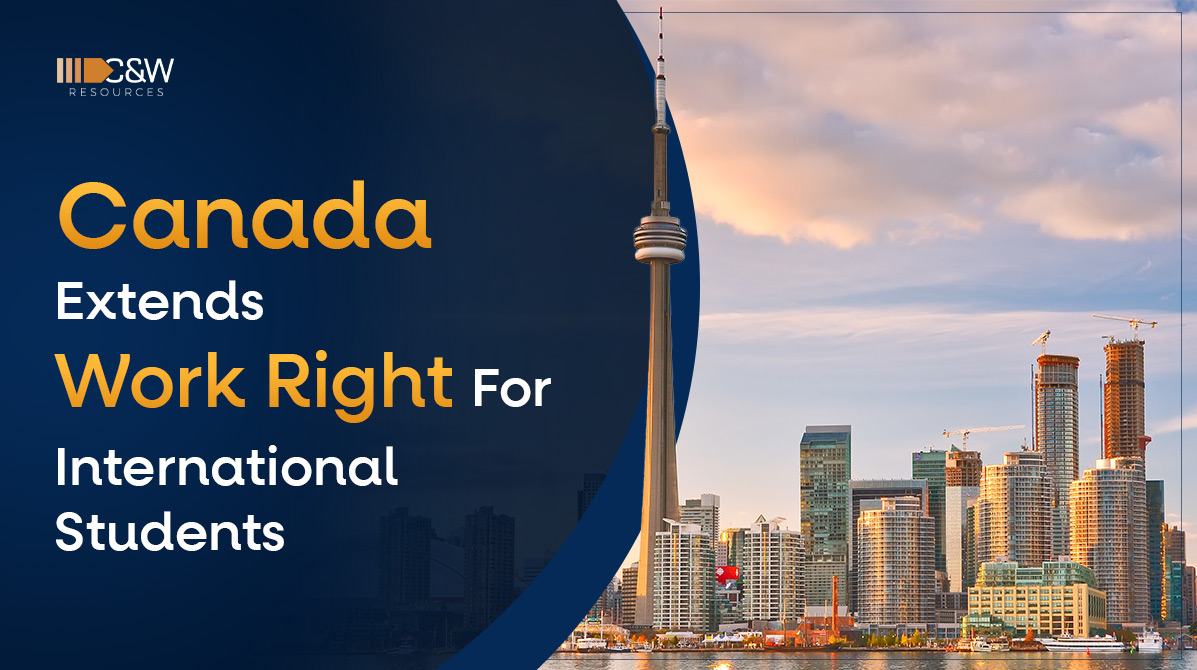
1. Policy Shift: Broader Work Opportunities
Post-Graduation Work Permit (PGWP) Extension
One major change in Canadian work rights for international students in 2024 is the expansion of the Post-Graduate Work Permit (PGWP). The previous policy allowed students to work up to 3 years after completing their study program, depending on the study period. However, to address ongoing labor shortages across sectors, including healthcare, engineering, and technology, the government has retained work permits for durations of up to four years in some instances.
The Canadian Minister of Immigration, Refugees, and Citizenship (IRCC) stated that students with an expiring PGWP in the following years, 2023 and 2024 are eligible to apply for the new 18-month open work permit extension, so they can work in Canada legally while applying for permanent residency.
2. Participating Organizations
- Immigration, Refugees, and Citizenship Canada (IRCC): The IRCC is the primary body that regulates immigration issues, such as the PGWP program and other permits. The rules and updates set here determine the employment rights of international students.
- Employment and Social Development Canada (ESDC): ESDC serves as a critical participant in Canada’s labor market policies and is responsible for aligning immigration or work permits with the demands of the Canadian labor market. It periodically collaborates with the IRCC to address labor shortages through immigration channels.
- Colleges and Institutes Canada (CICan): It comprises several universities and colleges nationwide. CICan works to implement favorable policies for international students and assists them in finding employment.
- Canadian Bureau for International Education (CBIE): CBIE operates to provide international students in Canada with relevant materials and guidance on work permits and available jobs.
3. PGWP Eligibility and Application Process
The PGWP enables international students who have completed a qualifying Designated Learning Institution (DLI) program to stay and work in Canada. The eligibility requirements are as follows:
- Program Duration: The PGWP validity period depends on the length of the academic program pursued by the foreign student. If your program is less than eight months, you will not be eligible to apply for the PGWP. If the program has taken more than eight months but less than two years, the PGWP is equivalent to the program length. For programs for two years or more, one can apply for a work permit valid for a period not exceeding three years with a possibility of renewal under specific considerations.
- Application Deadline: International students must apply for the PGWP 180 days after receiving their final grades or a letter confirming their program completion.
4. Enhanced Pathways to Permanent Residency
Canada’s focus on retaining skilled graduates is not limited to issuing temporary work permits. The Canadian Experience Class (CEC) and the Provincial Nominee Program (PNP) are the direct routes to permanent residency. As of 2024, it is expected that the Canadian work experience will remain favorable for international students in the Express Entry system, making it easier for graduates to transition to permanent residence.
Also, some provinces, such as Ontario, British Columbia, and Alberta, have created pathways within their respective PNPs to facilitate international graduates in technology, healthcare, and business administration.
5. How Students Can Benefit from These Changes
Here are a few tips for international students in Canada to make the most of the extended work rights:
- Keep Yourself Updated on Immigration Policies: It is advisable to frequently review the IRCC website and seek legal advice regarding the new rules, working permits, and residency procedures.
- Explore Job Opportunities in Growing Sectors: Focus on areas that are likely to improve the employment sector in Canada, such as Information Technology, medicine, and Green Tech.
- Connect with Industry Leaders and Career Services: Most universities and colleges have career departments and organize fairs and meetings that enable students to connect with employers. Take advantage of such resources to look for internships or co-op programs, which are a stepping stone toward getting a job
FAQs
What is the Post-Graduation Work Permit (PGWP)?
The PGWP allows international students to work in Canada after graduation for up to three years, with recent extensions offering additional time.
Can I extend my PGWP?
Yes, students with an expiring PGWP can apply for an 18-month open work permit extension.
Who is eligible for a PGWP?
International students who complete a qualifying program from a Designated Learning Institution (DLI) are eligible.
How long can I stay in Canada on a PGWP?
Depending on the program duration, the PGWP can last from 8 months to 3 years, with possible extensions.
What are the high-demand sectors in Canada?
Technology, healthcare, and green technology are among the high-demand sectors.
Can I apply for permanent residency after my PGWP?
Yes, programs like the Canadian Experience Class (CEC) and Provincial Nominee Program (PNP) offer pathways to permanent residency.
How long do I have to apply for a PGWP after graduation?
You have 180 days after receiving your final marks to apply for a PGWP.
What challenges might international students face?
International students may face competition in the job market and complexities in understanding immigration processes.
Do provinces offer specific programs for international graduates?
Yes, provinces like Ontario and British Columbia offer special immigration streams for international graduates.
Where can I find more information on work permits?
You can visit the official IRCC website or consult with an immigration advisor at your institution.
Recent Posts
- Unlock Your Tech Potential: Study Computer Science in France
- Studying Medicine in Hungary: Is It a Good Choice?
- Cheap Universities In Lithuania For International Students
- Study in Hungary Requirements for Bachelor’s, Master’s, and PhD Programs
- Admission Requirements for Study in France | Complete Guide




